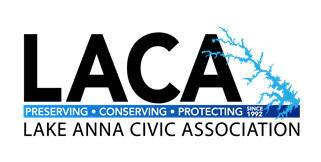By Zachary Morrow - August 2020
“What in the world?!” Similar to that of other first-time observers of the mysterious object pictured below, this was our reaction as we inspected the yellow-brown sphere just off our dock in Sunset Cove (North Anna River up-lake portion).

On Saturday morning, June 13, my wife Carmen pointed out something at the foot of our family’s dock ladder, just beneath the water’s surface. While I initially surmised the 4-inch mass to be some sort of egg deposit like that of a bullfrog, it looked more like a sponge and didn’t jiggle with the motion of passing wake. Since my phone had a (hopefully) waterproof case, I dunked it beneath the surface to take some pictures, which revealed the presence of another, similarly-sized object at the other end of the rung. After reviewing the pictures and executing a quick web search, Carmen identified the objects as bryozoan pods, which are colonies of multiple bryozoans of the same species.
Also referred to as “moss animals”, phylum Bryozoa comprises over 5,000 species of aquatic invertebrate filter feeders which inhabit marine, freshwater, and brackish environments. With the exception of one genus, all bryozoans are colonial. Somewhat analogous to how coral is a colony of individual polyps, a bryozoan pod is a colony of constituent zooid clones; the colony members cannot survive independently. While individual zooids grow to a size of about 0.5 millimeters (mm), or 0.02 inches, colonies have been observed at sizes up to a few feet in length.
Bryozoans can be a normal component of freshwater food webs; since they have natural prey and predators, their presence in a balanced, healthy ecosystem should not be cause for alarm. Predators of freshwater bryozoans include snails, insects, and fish. Bryozoans are known to feed on various microorganisms, like green algae, cyanobacteria (blue-green algae), and other bacteria. Zooids responsible for feeding the colony strain their food from the water with their “crowns” of hollow tentacles.
Sighting the unusual creatures was an adventure in and of itself. As a Lake Anna community member who has a science background, I was even more intrigued to learn that some bryozoans are predators to blue-green algae and other bacteria. Such algae and bacteria have been a focal point of the LACA Water Quality Committee’s monitoring program. I am initially interested in bryozoans’ utility as a bioindicator whose presence might provide insight about the balance or health of the lake’s ecosystem.
Bryozoan pods similar to the ones we saw in Lake Anna have also been observed elsewhere in the Mid-Atlantic region in Newport News, Virginia and Delaware. Online resources indicate that bryozoan pods do not pose a threat to human health and the environment under normal circumstances and that they should be left undisturbed when encountered. The pods we observed detached from the dock ladder and disappeared into the lake before the end of that same Saturday.
References:
Wikipedia contributors, "Bryozoa," Wikipedia, The Free Encyclopedia, https://en.wikipedia.org/w/index.php?title=Bryozoa&oldid=967216405 (accessed July 20, 2020).
Koth, William, “Delaware’s Most Famous Freshwater Bryozoan,” WMAP Blog, The Official Blog of the Wetland Monitoring & Assessment Program, https://wmap.blogs.delaware.gov/2018/12/01/delawares-most-famous-freshwater-bryozoan/ (accessed July 20, 2020).
